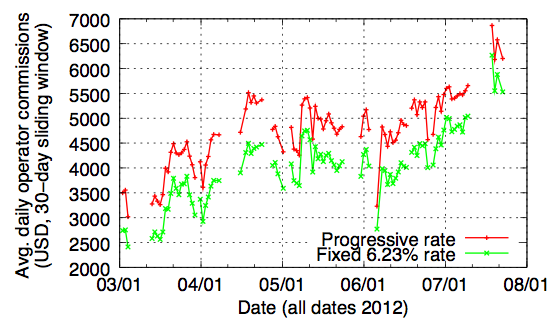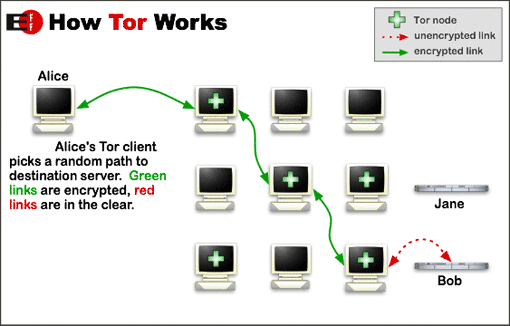
About
Silk Road is an online black market which can only be accessed via The Onion Router (TOR) anonymous web browsing client. On the site, goods are sold in exchange for Bitcoins, a peer-to-peer digital crypto-curency created by Satoshi Nakamoto. Many of the sellers specialize in selling drugs, oftentimes shipping to countries where they are illegal to possess.
History
The Silk Road[11] website began development in November of 2010 and was launched three months later in February of 2011. The site remained relatively unknown until June 1st, 2011, when Gawker[5] published an article by staff writer Adrian Chen titled “The Underground Website Where You Can Buy Any Drug Imaginable.” On July 28th, 2012, the tech news blog Gizmodo[13] reported that a man from Melbourne, Australia had been arrested for attempting to import drugs purchased on the site. On August 1st, 2012, a paper titled “Traveling the Silk Road: A measurement analysis of a large anonymous online marketplace”[12] was released by Carnegie Mellon computer security professor Nicolas Christin, which reported that the site’s total sales had increased to approximately $1.9 million a month (shown below).

Use of Bitcoin
The Bitcoin protocol was first described by Satoshi Nakamoto[2] in a paper[4] distributed on a cryptography mailing list[3] on October 31st, 2008. The Bitcoin network itself was created on January 3rd, 2009, which included the release of the first Bitcoins and an open-source Bitcoin client. Bitcoins use a peer-to-peer network that regulates the currency according to network software, with no more than 21 million Bitcoins issued in total by 2140. Bitcoins can be purchased and current exchange rates can be viewed on the MT Gox[8] Bitcoin exchange.
FBI Seizure & Closure
On October 2nd, 2013, the U.S. Federal Bureau of Investigations (FBI) shut down Silk Road and arrested its suspected owner Ross William Ulbricht, a 29-years-old University of Texas graduate living in San Francisco, California, on charges of narcotics trafficking conspiracy, computer hacking conspiracy and money laundering conspiracy. In addition, the authorities also seized $3.6 million worth of digital currency Bitcoin, the de facto currency used to complete transactions on the site. According to the court documents[18], the site allegedly facilitated more than 1.2 million illegal transactions involving 146,946 unique buyers and 3,877 unique vendors, generating more than 9.5 million bitcoins, or $1.2 billion, in total revenue. The files also revealed that Silk Road collected about $79.8 million worth of bitcoins in commission and site administrators received salaries of $1,000 to $2,000 weekly.

That same day, The Daily Dot published a summary digest of the FBI’s official complaint filed against Ulbricht. According to the files, the investigation began in January 2011, around the same time Silk Road was launched, with an individual who used the handle “Altoid” to advertise a Tor-protected anonymous black market on recreation drug forums and BitCoin discussion sites. Then in October, Altoid posted a job listing on BitcoinTalk forum in search of “an IT pro in the Bitcoin community,” adding his personal e-mail account “rossulbricht at gmail dot com” as the reply address. After examining his records from Google, the FBI was soon able to determine that “Altoid” is an account used by Ross William Ulbricht.
Reopening
On November 6th, 2013, the deep web news site All Things Vice[19] reported that the Silk Road had re-opened under the name “Silk Road 2.0,” speculating that the newly restored website could be an authentic effort made by old Silk Road administrators or a so-called “honeypot” site set up by the law enforcement. As of November 15th, account registration remains limited to invitation-only. In the following days, the rumored revival of Silk Road was picked up by numerous internet blogs and mainstream news outlets.[20][21][22]

BitInstant CEO Arrest
On January 27th, 2014, the U.S. federal authorities arrested Charlie Shrem, the CEO of Bitcoin exchange website BitInstant, at the JFK International Airport on charges of laundering more than $1 million worth of bitcoins for Silk Road customers and operating an unlicensed money-transmitting business. On the following day, the FBI arrested one of Shrem’s suspect partners Robert Faiella on the same charges. According to the criminal complaint and an investigation by the Internal Revenue Service, Shrem and Faiella exchanged $1.05 million in bitcoins over a 10-month period, during which they stayed in touch via e-mail correspondences to ensure that their transactions remain undetected from cash-processing companies.
Silk Road 2.0: FBI Seizure & Closure
On November 6th, 2014, the FBI announced in a press release[23] that the operator of Silk Road’s successor site has been arrested, identifying the man as 26-year-old San Francisco resident Blake Benthall[24] (a.k.a. Defcon). According to the federal officials, Silk Road 2.0 facilitated upwards of $8 million per month in transactions through more than 100,000 users over the course of one year since the closure of the original marketplace. That same day, the U.S. Immigration and Customs Enforcement agency posted a notification of seizure and closure on the website of Silk Road 2.0 (shown below).

The Daily Dot[25] published an article about Benthall, which included images taken from his Facebook[26] and Instagram[27] pages (shown below). The article also revealed that Benthall could face decades in prison on charges of conspiring to commit narcotics trafficking, conspiring to commit computer hacking, conspiring to traffic in fraudulent identification documents and money laundering.


Features
The site allows users to browse an online market through several categories linked in the sidebar, including drugs, apparel, books, digital goods, drug paraphernalia, erotica and forgeries. The drugs category contains several subcategories, including psychedelics, cannabis, dissociatives, ecstasy, opioids, prescriptions and stimulants. Buyers can register for free without an email but sellers must purchase a special account. Similar to other online marketplaces, users can rate their experiences with individuals sellers to report back if the product they purchased was of sufficient quality and delivered in a timely manner.

TOR
The Silk Road website can only be accessed via TOR anonymous browsing client, which allows its users to browse the Internet anonymously by separating identification and routing, thus concealing network activity from surveillance. The alpha version of the TOR software was announced via FreeHaven.net[9] mailing list on September 20th, 2002, followed by its presentation at the 13th USENIX Security Symposium on August 13th, 2004.

Reception
On June 6th, following the publication of Adrian Chen’s article on Gawker, United States senators Joe Manchin and Charles Schumer sent a letter[10] to the U.S. Attorney General urging law enforcement agencies to shut down the Silk Road website. On June 12th, the Sydney Morning Herald published an article titled “Drugs Bought With Virtual Cash,” reporting that the site would be moving to a new server in order to handle a marked increase in traffic. The article went on to report that Silk Road’s increase in popularity corresponded with a rise in the value of Bitcoins. On July 16th, 2012, Gawker[7]published a follow-up article titled “Are Authorities Closing in on the Online Drug Market Silk Road?”, which reported on rumors that had been circulating about authorities going after Silk Road’s administrator known as “Dread Pirate Roberts.” On June 30, 2013, the site was subject to a DDOS attack which limited access to it through the following day.[14]
Search Interest
External References
[2]Bitcoin.it – Satoshi Nakamoto
[3]Gmane.org – Bitcoin P2P e-cash paper
[5]Gawker – Undergrounds Website Where You Can Buy Any Drug Imaginable
[6]Sydney Morning Herald – Drugs bought with virtual cash
[7]Gawker – Are Authorities Closing in on the Online Drug Market Silk Road
[8]MTGox – Bitcoin Exchange
[9]Seul – run an onion proxy now!
[10]Senate.gov – Manchin Urges Federal Law Enforcement to Shut Down Online Black Market for Illegal Drugs
[11]Silk Road – Silk Road Anonymous Market
[12]Arxiv.org – Travling the Silk Road
[13]Gizmodo – Melbourne Man Arrested After Allegedly Importing Drugs Via Silk Road
[14]BBC News – Dark web drugs site Silk Road knocked offline by hacker
[15]The Verge – FBI seizes underground drug market Silk Road, owner indicted in New York
[16]Daily Dot – Silk Road closed: Founder of Dark Web’s drug marketplace arrested
[17]Reuters – FBI shuts alleged online drug marketplace Silk Road
[18]Scribd – Ulbricht Criminal Complaint
[19]All Things Vice" – Remember, Remember… Silk Road redux
[20]BBC News – Dark net marketplace Silk Road ‘back online’
[21]CNN Money – How Silk Road was reborn
[22]Motherboard – If Silk Road Gets Shut Down, It Will Be Back Online in 15 Minutes
[23]FBI– Operator of Silk Road 2.0 Website Charged
[25]The Daily Dot – Everything we know about the alleged Silk Road 2.0 kingpin
[26]Facebook – Blake Benthall
[27]Instagram – @blakeisblake


















